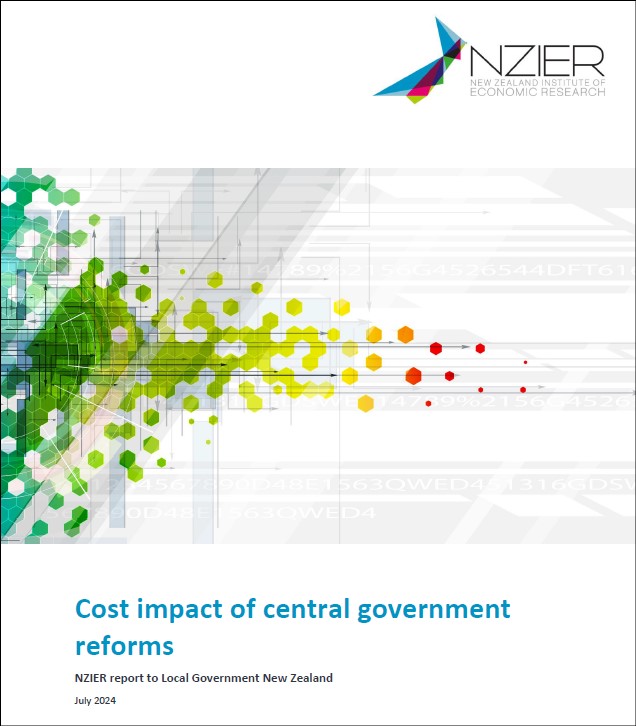Cost impact of central government reforms
Author:
NZIER, Christina Leung, Ting Huang, Philippa Miller Moore, Thomas HughesSource:
NZIER, New Zealand Institute of Economic ResearchPublication date:
2024Topics:
EconomyExtract
Key points
Local Government New Zealand (LGNZ) commissioned NZIER to assess and, where possible, quantify and develop case studies on four policy areas that have been mandated by central government. The costs and resourcing for the development of policy and implementation have fallen on local government. These are unfunded mandates.
The four policy areas are:
- Implementation of the National Policy Statement for Freshwater Management (NPS-FM) 2020 and subsequent amendments
- National Policy Statement on Urban Development (NPS-UD) and Medium Density Residential Standards (MDRS)
- Sale and Supply of Alcohol Act 2012, specifically Local Alcohol Policies (LAPs)
- Improving recycling and food scrap collections.
What we found
1. The central government policy mandates are not often in the best interest of the local councils and communities. In particular, they:
• Add detail and prescription, especially when they focus on the process of implementation, and this does not necessarily add value
• Do not always align with community desires or needs and have often been unsuccessful in nudging communities to support the desired outcomes:
− Elected members are unenthusiastic about implementing central government policies that are out of sync with local views
− Divert or displace (crowds out) activity and budget that is masked by the aggregation of financial information.
2. Uncertainty about mandates creates additional costs for councils
• Central government policy mandates are subject to change. This creates uncertainty relating to the direction of policy and the risk of the expansion of policy and regulation:
− This can create sunk costs and have significant implications for resourcing capacity, as well as the local commitment to implementation.
• It is not clear whether central government policy takes into account the local government policy processes prescribed by the Local Government Act and the Resource Management Act:
− As a result, some of these policies may not have achieved the outcomes that were intended
• Central government policy mandates can often create ‘unintended consequences’ or unforeseen outcomes:
− Lack of consensus outside Wellington on central government policies that are being mandated means that they get relitigated through the local government process.
− Cost and time of hearings and appeals
Estimates of the expected costs of implementation for these policy mandates in the ex-ante analyses published by the central government1 often suggest that the impact on local government budgets is not material. These estimates have not considered the need for rework and the cost of consultation and hearings on policy changes at the local level.
3. It is difficult to attribute the costs of reforms from council financial statements
•There is little or no detail within the published local government financial statements or local authority financial data to allow us to clearly identify expenditure on these mandates or to identify changes in expenditure that might be the result of these mandates. This is an issue across both central and local government and has been called out by other agencies (Office of the Auditor General 2023; Parliamentary Commissioner for the Environment 2024).
• Central government policy mandates had some overlap with local government business as usual (BAU), so it is difficult to identify additional costs.
4. A lack of availability and consistency in cost information makes it harder to provide robust evidence about cost impacts on local government
From the councils we have spoken to, we have found that there is a lack of availability and consistency in the way the costs are recorded. ...
NZIER July 2024
See also
Local Government New Zealand
